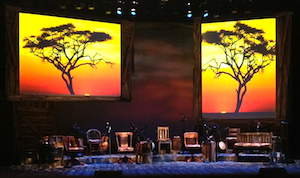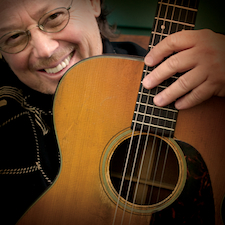Theatre Review: “It Ain’t Nothin’ But The Blues” at Portland Center Stage
 On May 25, 2012 I attended the opening-night performance of Portland Center Stage’s latest production, “It Ain’t Nothin’ But The Blues.” This is an ambitious show, tracing the evolution of blues music from its roots in ancient African chants and slavery-era field hollers to the contemporary forms that we love so much today. And it lives up to the challenge, thanks to a cast of seven strong performers and a very skilled five-piece band. As you might expect, the music is a mix of raucous, up-tempo shouting blues numbers and slower, more subdued tunes that evoke potent moods from somber to sexy. Two projection screens above the actors help to move the narrative along and underline the show’s emotional content by displaying relevant period photographs.
On May 25, 2012 I attended the opening-night performance of Portland Center Stage’s latest production, “It Ain’t Nothin’ But The Blues.” This is an ambitious show, tracing the evolution of blues music from its roots in ancient African chants and slavery-era field hollers to the contemporary forms that we love so much today. And it lives up to the challenge, thanks to a cast of seven strong performers and a very skilled five-piece band. As you might expect, the music is a mix of raucous, up-tempo shouting blues numbers and slower, more subdued tunes that evoke potent moods from somber to sexy. Two projection screens above the actors help to move the narrative along and underline the show’s emotional content by displaying relevant period photographs.
The four men and three women in the cast are all impressive singers and stage-savvy performers. Their affection for the music is obvious, perhaps most notably in the case of Sugaray Rayford, who makes his living singing the blues as a member of the internationally-renowned group The Mannish Boys and also fronting his own band. Rayford’s impassioned treatment of “Hoochie Coochie Man” is a true show-stopper – he sinks his teeth into the tune and doesn’t let go until the last full-throated yell. Another standout moment is Chic Street Man’s slow, subtle and salacious version of “Crawlin’ King Snake” – by stripping it down to just guitar and vocal, he vividly demonstrates the raw power of the blues form. Every one of the performers contributes significantly, demonstrating a true understanding of what makes this music fundamentally important. Here and there some of the songs get more of a “show tune” treatment than I would prefer to hear, but it’s understandable given the setting, and clearly the majority of the audience was untroubled by this.
A key element of the show’s success is the band backing up the performers; Portland Center Stage assembled a group of true heavy hitters for the task. Every band member has a long list of impressive pro credits, and it’s plainly evident that they can all play. There is notable solo work by Ross Seligman on guitar and David Milne on sax and clarinet, and Calvin Jones offers some deliciously expressive upright bass playing on a few songs. Keyboardist Mark T. Jordan is obviously a monster player, but he was frequently buried in the mix the night I attended (a frustration for this keyboard player). It’s worth noting that the band takes the stage only in the second act of the production; during the first act the musical backing is provided entirely by cast members Mississippi Charles Bevel, Chic Street Man and Trevor Wheetman (with the exception of a walk-on guitar solo by Seligman).
I do have a few minor quibbles with the show. First, in a production celebrating the blues tradition and tracing its origins, I was surprised to hear a lyrical error in one of the most monumental songs of the genre: Robert Johnson’s “Walkin’ Blues.” Mississippi Charles Bevel sings, I’m leavin’ this morning / If I have to rob the blind… While this line has occasionally been misheard, it’s well-established that the correct words are …if I have to ride the blinds. “Riding the blinds” was common slang for riding a train “in the spaces between the baggage or mail cars near the coal tender which have no side doors” (Prof. Christopher Cook), so as not to be seen by the conductor or other railroad staff. The phrase was also understood to mean illegally traveling by freight train in a general sense. It’s pretty clear from listening to Robert Johnson’s original recording that he’s not talking about robbing anyone; the same goes for the innumerable cover versions that have occurred over the years.
Speaking of Robert Johnson, I wasn’t surprised to hear the old story trotted out about him going to a crossroads and having prodigious musical abilities conferred upon him by the devil in exchange for his soul…but it grates nonetheless. Extensive research has shown that it was more likely Johnson’s contemporary Tommy Johnson (no relation) who made the audacious claims regarding the crossroads, and that Robert Johnson was simply a very good guitar player. But thanks to Robert’s song “Cross Road Blues” (whose lyrics actually make no reference to a meeting with the devil or handing over one’s soul) the legend was attributed to him over time. I do understand that the play’s story arc is much less complicated without making a detour to discuss Tommy Johnson, but personally I’d rather they simply omitted the crossroads legend altogether and avoided propagating this misplaced myth.
Finally, while the playwrights correctly make the point that country music originates partly from the blues, I would have gladly passed on the songs they chose to include from that genre in favor of fitting more classic blues selections into the show. I feel similarly about “Fever,” which to my mind is practically a pop song due to Peggy Lee’s recording (in stark contrast to Little Willie John’s original recording, which is much more soulful but largely unheard).
Putting the above reservations aside, I have to emphasize that “It Ain’t Nothing But The Blues” is a hugely entertaining play, and it makes me incredibly happy to see blues music receive some well-deserved attention in such a pro-level production. At various points during the play I glanced around the room and was surprised to see audience members who were not moving in time with the music – this was more than I could manage. Whether you already love the blues or you’re just wondering what the fuss is about with this genre they say is the foundation for everything that came since, you will be glad you saw this show. [...]
Runs May 22 – June 24
Tuesday – Sunday evenings at 7:30 p.m
Saturday and Sunday matinees at 2 p.m.
Thursday matinees at noon
Click for full information and tickets


 Ask any aspiring musician if he or she would like to be an institution someday, and chances are you’ll get an unqualified yes. But find a musician who is an institution, and try asking him if it’s as cool as it sounds. You might be surprised by the response.
Ask any aspiring musician if he or she would like to be an institution someday, and chances are you’ll get an unqualified yes. But find a musician who is an institution, and try asking him if it’s as cool as it sounds. You might be surprised by the response.

